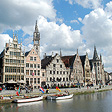CASTLE GRAVENSTEEN - GHENT
Castle of the Counts of Flanders
 Flanders no longer
exists as a country, now the northeastern part of Dutch speaking Belgium.
It’s medieval capital of Ghent was once
the largest city in Europe after Paris, built by the wool trade and evidenced
by its many grand medieval structures divided by the River Lys which
flows through its old center. In 1180, after his travels on the First
Crusade, Count Philip of Alsace returned to the lowlands of Flanders
and found himself at the point of war with Picardy in northern France.
He built a stone fortress on the site of an earlier wooden defense at
the edge of the river in the heart of Ghent, based on the ideas of the
castles he had seen of his fellow crusaders. Philip died in Jerusalem
on the Second Crusade, but for the next 300 years the successive Counts
of Flanders based themselves in the strong walls of Gravensteen, which
in Dutch literally means the Count’s Castle.
Flanders no longer
exists as a country, now the northeastern part of Dutch speaking Belgium.
It’s medieval capital of Ghent was once
the largest city in Europe after Paris, built by the wool trade and evidenced
by its many grand medieval structures divided by the River Lys which
flows through its old center. In 1180, after his travels on the First
Crusade, Count Philip of Alsace returned to the lowlands of Flanders
and found himself at the point of war with Picardy in northern France.
He built a stone fortress on the site of an earlier wooden defense at
the edge of the river in the heart of Ghent, based on the ideas of the
castles he had seen of his fellow crusaders. Philip died in Jerusalem
on the Second Crusade, but for the next 300 years the successive Counts
of Flanders based themselves in the strong walls of Gravensteen, which
in Dutch literally means the Count’s Castle.
 If
I die prematurely it will likely be from a heart attack climbing a
steep hill to a castle.
Fortunately for me and fellow tourists, the
lowlands
of Flanders are mostly flat and Gravensteen Castle is right in the center
of Ghent, with the climbing only to reach the high tower
battlements with a vista over the beautiful old city.
If
I die prematurely it will likely be from a heart attack climbing a
steep hill to a castle.
Fortunately for me and fellow tourists, the
lowlands
of Flanders are mostly flat and Gravensteen Castle is right in the center
of Ghent, with the climbing only to reach the high tower
battlements with a vista over the beautiful old city.
 The castle of Gravensteen
in Romanesque style lost its use as
a medieval defense fortress as early as the 14th Century as the city
expanded around it. It
had been used as a cotton mill, court, prison (see Count Egmont
& Hoorn),
and money mint, and by the middle of
the 19th Century, in such a state of disrepair, was to be torn down.
Instead, in 1885 the city of Ghent bought the castle and began a rebuilding
and preservation project. The castle in the heart of Ghent, while in
the form it had been in the days of Philip of Alsace has been heavily
refurbished,
The castle of Gravensteen
in Romanesque style lost its use as
a medieval defense fortress as early as the 14th Century as the city
expanded around it. It
had been used as a cotton mill, court, prison (see Count Egmont
& Hoorn),
and money mint, and by the middle of
the 19th Century, in such a state of disrepair, was to be torn down.
Instead, in 1885 the city of Ghent bought the castle and began a rebuilding
and preservation project. The castle in the heart of Ghent, while in
the form it had been in the days of Philip of Alsace has been heavily
refurbished,  so
some debate remains whether it can be called original. Parts of the actual
stone ruins can still be seen and the convenience
makes it one of the most visited of castles. Gravensteen is rather compact
as castles go, never having been expanded beyond its early form. Inside
the chambers are museum artifacts including a Guillotine, shackles and
other exhibits devoted to its days as a medieval "court" and
a modest armor collection in the banquet hall. A dungeon detention cell
is now a wishing well with coins tossed through the grate.
so
some debate remains whether it can be called original. Parts of the actual
stone ruins can still be seen and the convenience
makes it one of the most visited of castles. Gravensteen is rather compact
as castles go, never having been expanded beyond its early form. Inside
the chambers are museum artifacts including a Guillotine, shackles and
other exhibits devoted to its days as a medieval "court" and
a modest armor collection in the banquet hall. A dungeon detention cell
is now a wishing well with coins tossed through the grate.
Visiting Gravensteen Castle
 Some castles have
placards and signs telling of the history the stones have to tell,
other have audio guides. Gravensteen offers the rather
unique experience of having created a movie of scenes relating to events
in the castle’s history which plays on a device you carry with
you, pushing the numbered buttons corresponding to the room you enter.
You can hang it around your neck and just listen like an audio guide,
or follow the story of actors playing the parts of the castle’s
historic characters. It’s included with paid admission or costs €3
with free admission. Admission for adults is €8, 19-26 is €6
and under 19 is free. The castle is open daily from 9am to 6pm, closing
at 5pm in the winter, January to March. © Bargain
Travel Europe
Some castles have
placards and signs telling of the history the stones have to tell,
other have audio guides. Gravensteen offers the rather
unique experience of having created a movie of scenes relating to events
in the castle’s history which plays on a device you carry with
you, pushing the numbered buttons corresponding to the room you enter.
You can hang it around your neck and just listen like an audio guide,
or follow the story of actors playing the parts of the castle’s
historic characters. It’s included with paid admission or costs €3
with free admission. Admission for adults is €8, 19-26 is €6
and under 19 is free. The castle is open daily from 9am to 6pm, closing
at 5pm in the winter, January to March. © Bargain
Travel Europe
Find best vacation & hotel deals in Flanders on Trip Advisor
Web Info
Ghent
Tourism
Visit Flanders
These articles are copyrighted and the sole property of Bargain Travel Europe and WLPV, LLC. and may not be copied or reprinted without permission.
SEE ALSO:
FRIDAY
MARKET SQUARE - GHENT
GODFREY
OF BOUILLON CRUSADER CASTLE
HENRI MAES BREWERY TOUR – BRUGES
MAGRITTE MUSEUM - SURREALISM IN BRUSSELS

